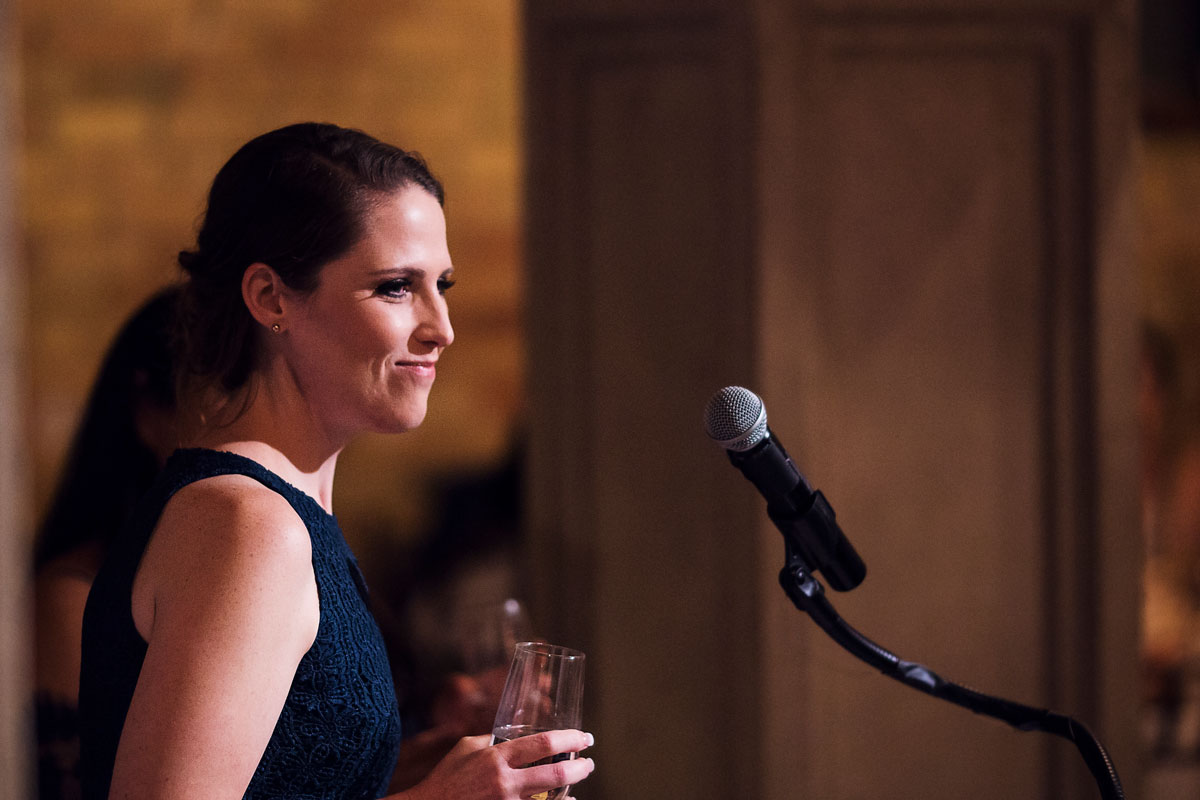I’m not sure how speeches came to being at weddings but whoever started the trend had some thing going and (maybe) didn’t know it. Speeches done well can quiet a restless crowd or create a shortage of Kleenex tissue like none other. In most cases, however, the reactions are not typically extreme, but they can be powerful.
In PART 1 of my series on speeches, I mentioned that the story-telling value of speeches can bring people together. People from different aspects of our lives have only parts of the story respectively – even more so with two separate people coming together.
So, if part one has got you thinking about WHO to give the horror… honour of doing a speech, then you’re on the right track. Along with the WHO, it’s now good to think about the WHAT and HOW. This might be an article you want to forward to your speech volunteers. Let’s talk about the content of the presentation.
As always, these are recommendations. I’m not one for absolutes since you’re trying to make your wedding unique and your own, but I give these insights because they can be useful in your considerations.
Don’t be this person
Have you ever gone to a wedding and the person starts with this (annoying) statement:
“Well, I didn’t prepare a speech, so I’m just going to speech from the heart”
Here’s another one:
“Well, I just found out that I was doing a speech so I’m just going to say a few words”

Here’s the problem with the first statement: As a speaker, you make yourself look irresponsible and now people are immediately going to take you less seriously. You also start to exude a LACK OF confidence, which is not in your favour, because psychologically, people pay less attention to people who they perceive to lack confidence. Likewise, don’t go up and open your time in front by saying that you’re nervous.
My suggestion here would be to not announce to everyone your lack of preparation. Sorry, I take that back; my suggestion is that you prepare a speech (read on)! But, say you didn’t, just start without preemptively seeking pity for rambling. This is one of the few times where “fake it ‘til you make” is good advice. Share as enthusiastically and confidently as you can. Keep it short and get back to your seat.
As for the second statement, ditto the advice above. Go with a plan. The word, “Few”, here is very subjective, especially in the vacuum of time that engulfs a lectern in front of 100 (or HUNDREDS of) people.
Speaking of plans, see a recommendation of a VERY basic outline below. If you’re a seasoned speaker or very artistic with your words, you don’t have to pay this any mind; you probably know what you’re doing! But for those of us whose last time speaking in front of people was for that class presentation you stayed up until the wee hours of the morning copying from your notes and pasting into a PowerPoint in school, this could be helpful:
- Brief introduction of yourself
- Brief explanation of how you know the couple
- your impression of them getting together or being together
- How they’re good for each other
- a significant moment or milestone in the relationship
- prediction on their life together
- well wishes
You can do a lot with this. Adding a short story is always a great idea too. However, try to keep it to 5mins. No matter how good your content is, if you go too long, people in most cases will start to get distracted.
Tips
Watch some examples on Youtube and find examples of ones you may like to model off.
Write your speech – even if it’s just point form to remind you of what to say
And on that note, avoid reading your entire speech from the front (unless you basically know it by heart and you’re an eloquent reader). There’s a reason why your high school teacher forbade the class from reading their presentations; typically, we talk in a robotic manner and our volume goes way down.
That being said, I typically don’t recommend reading letters from absent friends or family (see previous paragraph). You can pass those to the bride and groom to read on their own time or have someone else do their own original speech on that person’s behalf.
Maybe write it before the day of the wedding so it can have some time to percolate.
Get feedback. You may not need to do a full mock performance, but at least run your points by someone.
Phone or paper?
Bringing up your notes in written form is a good idea. But, if you must read from your preferred mobile device, do this:
1) make sure your device is charged or will have power at the time of your speech.
2) temporarily disable the power-saving features (screen locks and backlight dimming) so you don’t have to unlock the phone at the climax of your story and have to saying something embarrassing like, “oh wait, just gonna unlock my phone! Oh, technology!”
3) disable your notifications so you don’t get calls while you’re reading
4) save the speech in at least two places physically on the phone in case the cell phone reception at the venue is so poor that you can’t access your email (or file-syncing app like G-drive) where you saved it. If you’re not prepared for that, you’ll have to pull a “Well, I wrote a speech but I can’t open it so I’m jus’ gonna speak from the heart”
Thank-you speeches
I’ll close with a few quick tips for the bride and groom. If you’re not one of these, you can skip to the last paragraph.
- Ditto all the stuff from above
- Don’t thank everyone personally. This makes your speech drag on and you’ll probably miss someone in the heat of the moment anyway. Plus, the couple traditionally writes thank-you cards anyway, so you can express your gratitude specifically then. If and when you want to thank people, Perhaps thank “groups of people”. You could thank, your parents, siblings, your family, your in-laws, your wedding party, and your vendors as groups. Obviously, you can do whatever you want, and some people may have exceptionally contributed to the wedding and relationship. I get it – you might even want to give specific shout-outs to the maid of honour, a parent or the videographer 😉. Try to keep those to a minimum. I’ve sat through a 40-minute thank-you speech before… (I kid you not!)
- Don’t forget to recognize each other! This is especially true in more conservative weddings where there are no personal vows during the ceremony, like Catholic ceremonies, Hindu ceremonies, Nikkahs, etc. I mean, your new spouse is the reason the wedding is happening, isn’t s/he?
So there you go: a “few” words on how to bring the room together when speaking at a wedding.
If you see the honour of speaking as an opportunity to bring people together, it definitely changes your perspective
If you have any family or friends panicking about what to say or how to say it at an upcoming wedding, send this over to them!
I’d love to hear your thoughts.
As we narrate together!

Comments